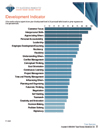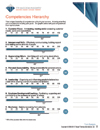| | |
| |
TTI Assessments & Related Tools
DNA Assessment Soft Skill Competencies
DNA Competencies Assessment
 Success in any job depends on the value of the person's contribution to the organization.
Success in any job depends on the value of the person's contribution to the organization.
Managers, mentors and professional coaches can encourage, advise and guide the individual as he/she grows professionally.
However, the ultimate responsibility for his/her career development is theirs alone.
This report is designed to assist individuals in managing and developing their careers.
For many jobs, personal skills are as important as technical skills in producing superior performance.
Personal skills are often transferable to different jobs, whereas technical skills are usually more specific.
Based on the responses to the Personal Soft Skills Indicator questionnaire, this report indicates the person's development of 25 personal skills.
These personal skills contribute to superior performance in many jobs.
These include:
Analytical Problem Solving
Anticipating, analyzing, diagnosing, and resolving problems.
Conflict Management
Addressing and resolving conflict constructively.
Continuous Learning
Taking initiative in learning and implementing new concepts, technologies and/or methods.
Creativity/Innovation
Adapting traditional or devising new approaches, concepts, methods, models, designs,
processes, technologies and/or systems.
Customer Service
Anticipating, meeting and/or exceeding customer needs, wants and expectations.
 Decision Making
Decision Making
Utilizing effective processes to make decisions.
Diplomacy
Effectively handling difficult or sensitive issues by utilizing tact, diplomacy
and an understanding of organizational culture, climate and/or politics.
Empathy
Identifying with and caring about others.
Employee Development / Coaching
Facilitating and supporting the professional growth of others.
Futuristic Thinking
Imagining, envisioning, projecting and/or predicting what has not yet been realized.
Goal Orientation
Energetically focusing efforts on meeting agoal, mission or objective.
Interpersonal Skills
Effectively communicating, building rapport and relating well to all kinds of people.
Leadership
Achieving extraordinary business results through people.
Management
Achieving extraordinary results through effective management of resources, systems
and processes.
Negotiation
Facilitating agreements between two or more parties.
Personal Effectiveness
Demonstrating initiative, self-confidence, resiliency and a willingness to take
responsibility for personal actions.
Persuasion
Convincing others to change the way they think, believe or behave.
Planning/Organizing
Utilizing logical, systematic and orderly procedures to meet objectives.
Presenting
Communicating effectively to groups.
Self-Management - Time and Priorities
Demonstrating self control and an ability to manage time and priorities.
Teamwork
Working effectively and productively with others.
 Levels of Development
Levels of Development
The individual's development of the personal skills are categorized into 4 levels:
1. Well Developed
2. Developed
3. Moderately Developed
4. Needs Development
While personal skills are certainly important for career development, it is not necessary to fully develop every one.
In fact, development of a personal skill may not benefit a career if it is not required in the current job.
In order to optimize career potential, it is best to focus development efforts on the personal skills that are required
in current job, or, the job the individual want.
The entire report should be read with an open mind. Everyone has areas where they can improve.
Before deciding to work on developing personal skills the individual has not yet fully developed, the person may want
to discuss the report with a trusted peer, mentor or professional coach.
He/She may even wish to share the report with his/her manager. In most cases, management takes a very positive view of
individuals who wish to develop their skills.
Development Indicator
This section of the report shows his/her development level of these personal skills based on the responses to the questionnaire.
The personal skills are categorized into 4 levels; based on means andstandard deviations.
Well Developed
Developed
Moderately Developed
Needs Development
Competencies Hierarchy
The person's unique hierarchy of competencies is key to his/her success. Knowing what they are is essential to reaching his/her goals.
The graphs rank ther competencies from top to bottom.
Competencies Development Break Down
These 4 sections of the report lists and describes the competencies in each of their 4 levels of development.
Getting the Most From Your Report
This section asks the person questions about the personal skills in which he/she:
is well developed.
is developed and moderately developed.
has not yet developed.
DNA Individual / Talent report report
DNA Job - Talent Gap report sample
DNA Job - Talent Comparison report sample
DNA Multi-respondent Job report sample
Please contact us for more information and pricing.
RELATED ASSESSMENTS
TriMetric DNA Coaching - Behaviors/DISC + Motivators + Soft Skill Competencies (3-in-1)
This report blends Behaviors / DISC, Motivators, and 25 Competencies. Based on responses to the Personal Soft Skills Indicator
questionnaire of the assessment, the DNA part of the report indicates the individual's development of 25 personal skills.
View more TriMetric DNA Coaching information
TriMetric DNA Coaching - Management-Staff / general report sample
TriMetric DNA Coaching - Leadership report sample
TriMetric DNA Coaching - Executive report sample
TriMetric DNA Coaching - Sales report sample
TriMetric DNA Coaching - Comparison report sample
TriMetric DNA brochure
COMPARISON REPORTS
These are a shorter, more visual report providing a side-by-side comparison of the results of TWO assessment respondents.
This very intuitive, accessible report can easily be used for employee conflict, onboarding new employees; promotion selection; employee development;
mentoring, leadership coaching; conflict -or- organizational consulting; and, matching employees to projects, etc.
Job Benchmarking
TriMetrix DNA Multi-respondent Job report
This assessment requests unbiased input regarding the specific requirements of the job, in question. Then this input is applied to the
TriMetrix DNA Job benchmarking process. The result is an evaluative report that analyzes a total of 41 separate areas.
View TriMetrix DNA Multi-respondent Job report sample
TriMetrix DNA Gap report
Long-term superior performance is directly related to job fit. Job fit, in simple terms, is having the talent that the job requires.
Most people match some, but not necessarily all, job requirements. When this happens, there is a gap. The gap is nothing more than an area for development.
This report makes it easy for both manager and subordinate to discuss and develop a plan for personalized development.
View TriMetrix DNA Gap report sample
Please contact us for more information and pricing.
These assessments are not a measure of intelligence, values, skills, experience, education or training.
OTHER ASSESSMENTS
View information about all of the Online Assessments / Reports
GROUP WHEELS for Online Assessments
Behaviors / DISC Group Wheel information
Motivators / 12 Driving Forces Group Wheel & Bar information
FACILITATOR MATERIAL
Role Exercise Games
Sales / Selling related
Additional Information
DNA - Uncovering Training Challenges With Brain Imaging
DNA - Neuro Regulation
DISC - Verbal Barriers
DISC - 10 mistakes
Technical Reports
TTI DISC / Behaviors Technical report
TTI Motivators Technical report
TTI DNA Competencies Technical report
TTI Combined Technical reports
Emotional Quotient Technical report
Return to TTI assessments & training tools main page.
| |
|
 |
Friday, February 27, 2026


























































|
|
|
|
|
|
|



















































































































































































